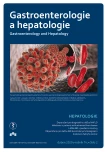-
Medical journals
- Career
Endoscopic drainage of infected pancreatic necrosis with complicated course – case report
Authors: Bawadekji Hexspoor D. 1; Tichý T. 1; Urban O. 1; Falt P. 1,2
Authors‘ workplace: II. interní klinika – gastroenterologie a geriatrie LF UP a FN Olomouc 1; Katedra interních oborů, LF UK v Hradci Králové 2
Published in: Gastroent Hepatol 2020; 74(2): 135-138
Category:
doi: https://doi.org/10.14735/amgh2020135Overview
This report describes a 55-year-old patient, who was transferred from a regional hospital for acute severe necrotizing pancreatitis complicated by the development of large, infected, walled-off pancreatic necrosis. Because of severe septic shock with high perioperative risk and multiorgan failure requiring artificial lung ventilation, the patient underwent endoscopic transgastric drainage of the walled-off pancreatic necrosis using a metallic lumen apposition stent. Efficient drainage and repeated endoscopic necrectomy resulted in overall gradual improvements in patient condition. Due to the complete regression of fluid collection after 5 weeks the metallic stent was extracted. The patient was fully realimented and rehabilitated after 2 months of hospitalization and was transferred to ambulatory care.
Keywords:
stent – acute pancreatits – drainage – endoskopy – pancreatic necrosis
Sources
1. Thoeni RF. The revised Atlanta classification of acute pancreatitis: its importance for the radiologist and its effect on treatment. Radiology 2012; 262(3): 751–764. doi: 10.1148/ radiol.11110947.
2. Manrai M, Kochhar R, Gupta V et al. Outcome of acute pancreatic and peripancreatic collections occurring in patients with acute pancreatitis. Ann Surg 2018; 267(2): 357–363. doi: 10.1097/ SLA.0000000000002065.
3. Kliment M, Urban O, Fojtík P et al. Endoskopická drenáž pankreatických tekutinových kolekcií – 6-ročná skúsenosť v terciárním gastroenterologickom centre v období rokov 2006–2012. Gastroent Hepatol 2017; 71(3): 199–207. doi: 10.14735/ amgh2017199.
4. Rasch S, Phillip V, Reichel S et al. Open Surgical versus minimal invasive necrosectomy of the pancreas – a retrospective multicenter analysis of the German Pancreatitis Study Group. PLoS One 2016; 11(9): e0163651. doi: 10.1371/ journal.pone.0163651.
5. Bakker OJ, van Santvoort HC, van Brunschot S et al. Endoscopic transgastric vs surgical necrosectomy for infected necrotizing pancreatitis: a randomized trial. JAMA 2012; 307(10): 1053–1061. doi: 10.1001/ jama.2012.276.
6. Akshintala VS, Saxena P, Zaheer A et al. A comparative evaluation of outcomes of endoscopic versus percutaneous drainage for symptomatic pancreatic pseudocysts. Gastrointest Endosc 2014; 79(6): 921–928. doi: 10.1016/ j.gie.2013.10.032.
7. Tenner S, Baillie J, DeWitt J et al. American College of Gastroenterology guideline: management of acute pancreatitis. Am J Gastroenterol 2013; 108(9): 1400–1416. doi: 10.1038/ ajg.2013.218.
8. Al-Omran M, Albalawi ZH, Tashkandi MF et al. Enteral versus parenteral nutrition for acute pancreatitis. Cochrane Database Syst Rev 2010; (1): CD002837. doi: 10.1002/ 14651858.CD002837.pub2.
Labels
Paediatric gastroenterology Gastroenterology and hepatology Surgery
Article was published inGastroenterology and Hepatology

2020 Issue 2-
All articles in this issue
- Covid-19 and the liver
- Editorial
- Guideline of the Czech Hepatology Society of the ČLS JEP for diagnosis and treatment of non-alcoholic fatty liver disease
- Doporučení pro léčbu idiopatických střevních zánětů v době pandemie covid-19
- Recommendations of the Slovak IBD Working Group on SGS for the Treatment of Biosimilar Anti-TNF Biologics in Adult and Pediatric Patients
- Endoscopic drainage of infected pancreatic necrosis with complicated course – case report
- Four-year experience of infliximab and adalimumab pharmacokinetics monitoring in patients with inflammatory bowel disease
- Position of vedolizumab in the current treatment of Crohn’s disease
- Laser lithotripsy as a solution of an obturating biliary stone in the colon
- Anderson-Fabry disease and gastrointestinal tract involvement
- Gastroenterology and gastrointestinal endoscopy under SARS-CoV-2 pandemic conditions
- 90th Associate Professor Milose Sedlackova, MD
- Anniversary of Ass. Hana Dvorakova, MD
- Comment on the article: Caha M, Politová P, Vlk R et al. The surprising cause of death of a patient with upper gastrointestinal bleeding. Gastroent Hepatol 2020; 74(1): 50–53. doi: 10.14735/ amgh202050.
- The selection from international journals
- Kreditovaný autodidaktický test
- Infection in patients hospitalised with advanced chronic liver disease (cirrhosis) – single-centre experience
- De novo non-alcoholic fatty liver disease after liver transplantation – as diagnosed by magnetic resonance
-
Novel Pancreatic Developmentsprof. Peter Layer – Gastro Update Europe 2019, Budapest
Nové poznatky o pankreatu -
Biliopancreatic endoscopy
prof. Marco Bruno – Gastro Update Europe 2019, Budapest - Novel Developments In Intestinal Endoscopy<br> prof. Oliver Pech – Gastro Update Europe 2019, Budapest
- Gastroenterology and Hepatology
- Journal archive
- Current issue
- Online only
- About the journal
Most read in this issue- Covid-19 and the liver
- Endoscopic drainage of infected pancreatic necrosis with complicated course – case report
- Guideline of the Czech Hepatology Society of the ČLS JEP for diagnosis and treatment of non-alcoholic fatty liver disease
- Doporučení pro léčbu idiopatických střevních zánětů v době pandemie covid-19
Login#ADS_BOTTOM_SCRIPTS#Forgotten passwordEnter the email address that you registered with. We will send you instructions on how to set a new password.
- Career

